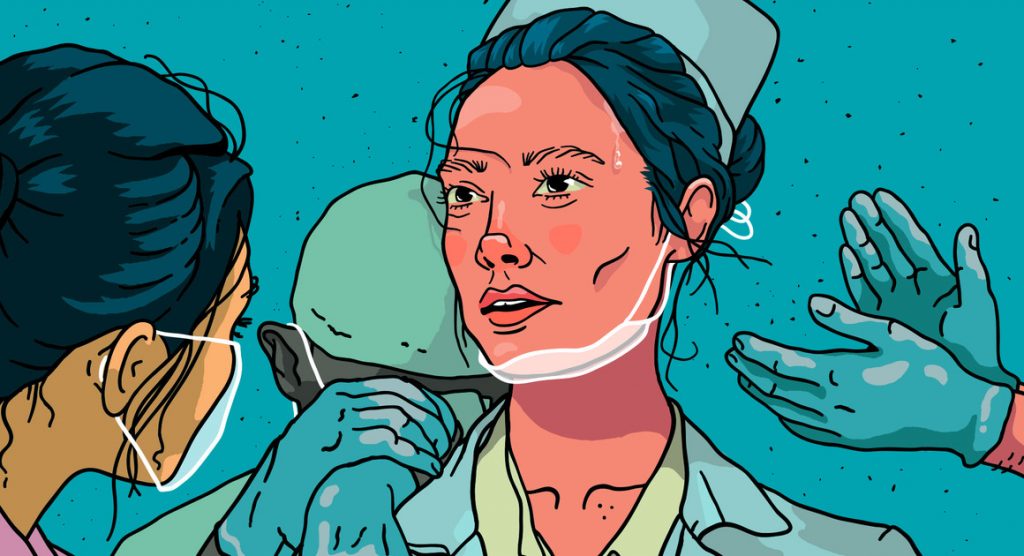April 7 has for many years been World Health Day, an occasion for international solidarity in the continuing fight for universal health care. This year The Lowdown has joined in with a series of articles highlighting the situation in various parts of the world, as health workers confront a similar series of issues in widely different circumstances.
This year’s World Health Day (April 7) fell during the gravest public health emergency in the history of the World Health Organization (WHO). Public Services International, the alliance of trade unions, reports in a statement by Baba Aye that: “Over a million people have been infected by the new coronavirus and it has killed about 70,000 people.”
“Healthcare workers on the front line of the COVID-19 response face a perilous situation. They are overstretched because our hospitals are grossly understaffed. And there is not enough personal protective equipment (PPE) to protect them properly.
“This sobering situation is worrying for health workers and their families. It also impedes the global pandemic response.”
“… As the Director General of the WHO noted at the beginning of 2020, we might be entering a period of pandemics which the world will be “dangerously unprepared” for.
“To avoid this, starting from now, governments must prioritise investment in health and take all necessary measures to safeguard the lives and wellbeing of health workers and other workers on the frontline of response without delay. We need safe workers to save lives.
This crisis further highlights the importance of the social and economic determinants of health. Poverty and overcrowded housing make social and physical distancing very difficult if not impossible for millions of people. In several cities, this has led to people shunning lockdown directives.
Lack of access to potable water for 40% of the global population means some people cannot apply even basic preventive measures such as handwashing.”
“… This global emergency illuminates the interconnectedness of public health and the international economic system. This much was realised at the 1978 Alma Ata Conference [of the WHO], where delegates released a declaration for “health for all by 2000”, noting that this could not be achieved without establishing a new international economic order which puts people over profit.
“Unfortunately, over the past 42 years since that historic declaration, the neoliberal model of development has been the norm. The consequence has been concentration of wealth in a few hands while public services, including healthcare, have been underfunded, marginalised and left to rot.
“This has resulted in an avalanche of crises; a massive global recession, a climate and ecological crisis, erosion of social protection and informalisation of work and living for the vast majority of people.
“The current pandemic might have been unpredictable. But strong public health systems rooted in a global economic order which prioritises solidarity and the wellbeing of people and the planet over the profits of a few would have made it much more manageable.”
PSI calls on all governments to:
- Urgently make PPE available to all health workers, including community health workers, as well as workers in all sectors with high risk of contagion. And COVID-19 should officially be considered an actionable occupational disease in the health sector.
- Provide free medical testing for workers still delivering public services, and treatment for infected workers, as well as mental health and psychosocial support (MHPSS), particularly in the health sector.
- Ensure respect for occupational safety and health obligations ….
- Take over local factories for reconversion to produce PPE as well as ventilators, test kits, and all other needed medical devices and supplies. Similarly, private hospital facilities should be taken over to increase the number of available Intensive Care Unit beds.
- Curb business interests of the pharmaceutical industry in the interest of humankind. Patent rights over pharmaceutical products that needed for treatment of COVID-19 must be suspended and laboratories working on vaccines for the disease brought under public control.
- Address gender dimensions of the crisis. Women make up 70% of all health workers and their concerns should be put in perspective. The necessary shutdown of schools poses a problem for many of them who have young children. The situation is even more difficult for single mothers or when both parents are health workers. Childcare support mechanisms must be put in place for them as needed.
- Requisition empty housing units and hotels to accommodate homeless people and those living in overcrowded circumstances, to reduce transmission of infection.
- Provide an inclusive and rights-based solution to migrants in detention (including those trapped at the borders) and refugees, asylum-seekers, migrants and displaced persons living in camps.
- Fully implement the recommendations of the UN-CommHEEG, including societal dialogue and political commitment to drive appropriate macroeconomic reforms and policies for the full realisation of universal public healthcare.
Dear Reader,
If you like our content please support our campaigning journalism to protect health care for all.
Our goal is to inform people, hold our politicians to account and help to build change through evidence based ideas.
Everyone should have access to comprehensive healthcare, but our NHS needs support. You can help us to continue to counter bad policy, battle neglect of the NHS and correct dangerous mis-infomation.
Supporters of the NHS are crucial in sustaining our health service and with your help we will be able to engage more people in securing its future.
Please donate to help support our campaigning NHS research and journalism.


